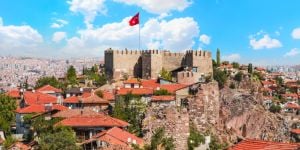
A mix of Middle Eastern mysticism and European tradition, Türkiye is a well-established tourist hotspot. Offering its visitors a glance back into history framed with picturesque mountaintops and Mediterranean beaches, it is a great place for vacation, but what is it like for remote work?
Why move to Türkiye
While most people working remotely have their own personal preferences when it comes to picking a destination, most are on the lookout for the magic three: warm climate, beautiful beaches, and the Internet. Türkiye offers just that and adds vibrant, lively cities and one of the world's best cuisines into the mix. Working in Türkiye will never get boring: from stunning historical locations to wondrous landscapes to admire, your offline time in the country will be filled to the brim with new experiences.
However, there is a substantial “but” to consider: with the recent changes in short-term residence permit regulations, staying in Türkiye for a longer period of time may prove to be rather complicated.
Visa options for digital nomads in Türkiye
Unfortunately, Türkiye doesn't have an official digital nomad visa. This means that if you are working remotely and have all the paperwork to prove that, you will still have to navigate the standard visa options for your stay in the country.
First, citizens of a number of countries can travel to Türkiye visa-free for a period of 30 to 90 days. This can be a great option for planning your intuitional visit to the country and getting acquainted with what the country has to offer.
If your home country is not on the list of visa-free states, you will need to apply for a tourist visa. These generally grant 30-day stays in the country and can be valid for a period of one to two years.
If you've liked what you've seen and have made the decision to stay in the country for longer, Türkiye offers short-term residence permits, also known as touristic residence permits.
Important:
As of January 2023, Türkiye is no longer issuing new touristic residency permits. Those who have held a permit since before February 2022 can still apply for permit renewals. As the rules regarding touristic residency in Türkiye tend to change frequently, we suggest you keep an eye on all the related updates.
Another option for staying in Türkiye for longer is purchasing property in the country. However, the minimal real estate investment has recently gone up from $75,000 to $200,000.
Other long-stay visa options include student and business visas. These visas require more specific conditions to be met and would not be fitting for every situation.
The best cities in Türkiye to work from as a digital nomad
Istanbul is Türkiye's former capital, largest city, and a popular gateway for exploring the rest of the country. It has a long history going back almost 3000 years. The population of Istanbul is close to 16 million people, and the city is Türkiye's cultural and financial center. Naturally, it's also the place where you will find the best infrastructure for setting up a remote working camp. Rich in history and nightlife and home to some of the biggest markets and best restaurants in the country, Istanbul is a popular choice not only among tourists but also among those looking for a convenient and exciting spot to work from.
Izmir is Türkiye's third-largest city and one of the most popular nomad destinations in the country. This picturesque city of about 4 million owes its popularity to the liveliness and energy generated by Izmir's young inhabitants: close to half of the city's population is under 30. It contains one of the best beaches in the country and draws thousands of tourists during the summer.
If you are looking to add a touch of idyllic living to your remote working experience, consider settling along Türkiye's turquoise coast. Cities like Bodrum, Marmaris, Fethiye, Kas, Kalkan, and others provide a stunning beach setting and a lively resort town ambiance. Note that in high season, these areas tend to get quite busy with tourists and living costs (such as rent and restaurant prices) tend to be on the rise. On the other hand, the low season offers a quieter and more laid-back atmosphere, crowd-free beaches, sweat-free hiking trails, lower living costs — and more.
Those looking to work in a resort-like setting with big city perks tend to choose Antalya, the largest city on Türkiye's southern coast of the Mediterranean. Large resorts line the city's coastline, offering all sorts of holiday entertainment and facilities, while the deeper parts of Antalya hide stunning historical ruins framed by green, lush mountains.
The internet and coworking spaces in Türkiye
As a popular travel destination, Türkiye has all the necessary facilities to accommodate its international guests as well as those who have chosen it as a remote work spot. You will have no trouble finding a spot to work from, whether it's an international resort or a small local coffee shop.
The average Internet download speed in Türkiye is 14.51 Mbps, and the average upload speed is 4.04 Mbps. Free Wi-Fi is available in most coffee shops, restaurants, hotels, and other public areas.
Coworking spaces in Istanbul
Kolektif House Levent, Esentepe Mahallesi, Talatpaşa Cd. No:5
Habita, Yeşilce Mahallesi, Ulubaş Cd. No:23
Beyond Ofis, Kemankeş Karamustafa Paşa Mahallesi, Halil Paşa Sokak, Ömer Abed Han, Kat 4 No. 10 Karaköy
Coworking spaces in Izmir
Originn Coworking, Kazım Dirik Mahallesi, 374/1. Sk. No.1
Imperium Offices, Konak Mahallesi, Kıbrıs Şehitleri Caddesi No. 20, Kazmirci İş Merkezi Kat 5 Alsancak
Coworking spaces in Fethiye
Hippocampus, Akarca, Mustafa Kemal Blv. No:173/B
Lokal Cowork, Akarca, Mustafa Kemal Blv. No:158/A
Coworking spaces in Bodrum
CoBodrum, Cevat Şakir Mah., Hoca Ahmet Yesevi Sok., No: 35
helo! Bodrum, Kumbahçe Mahallesi Paşatarlası Caddesi No: 29
Coworking spaces in Antalya
Coworking Antalya, Selçuk mahallesi, Tuzkapısı sokak, Kaleiçi Yat Limanı No:5
Creawork, Abdi İpekçi Cd. no:13 kat:1
Living in Türkiye as a digital nomad
Adapting to life in Türkiye as a digital nomad involves understanding and managing the cost of living, navigating the healthcare system, and overcoming language barriers. This beautiful country offers a unique blend of modern amenities and rich cultural heritage, making it an attractive destination for nomads worldwide.
Türkiye's cost of living can vary significantly depending on the city and lifestyle. Major cities like Istanbul and Ankara tend to be more expensive than smaller towns or rural areas. Additionally, popular resort destinations along the Turquoise coast also tend to be on the pricier side, especially during the high season.
Important:
In 2022, the Turkish lira depreciated by approximately 30% against the dollar, following a 44% decline in the previous year. As of 2023, 1 US dollar is worth 30 Turkish Liras, compared to just 6 Turkish Liras in May 2019. In short, the best-case scenario for managing living costs in Türkiye is receiving your income in a different currency, such as the Euro or USD. If your income comes in Turkish Lira, make sure to plan your budget carefully, being fully aware of the exchange rate fluctuations.
With that said, compared to many Western countries, living costs in Türkiye are generally lower, making it a budget-friendly option for digital nomads.
Rent will be your most significant expense when living in Türkiye. Keep in mind that rent prices are highly season-dependent. Renting accommodation in Türkiye at the height of the tourist season will be substantially more expensive than renting off-season. Shared apartments or co-living spaces in city centers are popular among digital nomads for their affordability and networking opportunities. Exploring options outside tourist hotspots can lead to more economical choices.
If you are looking to trim your daily expenses, consider buying fresh produce at local markets instead of supermarkets. Street food and local eateries are not only affordable but also a way to experience authentic Turkish cuisine.
Public transport in Türkiye is extensive and affordable. If you plan on using public transport a lot, consider getting a public transportation card, which makes most transportation fees a few liras cheaper.
In Türkiye, the cost of vehicles and fuel is relatively high. Due to local taxation, Türkiye ranks among the countries where car usage comes with some of the highest expenses in the world. The pricing for both new and used cars tends to be considerably higher than in many other countries. With a Value Added Tax (VAT) rate of 18%, bringing your car into Türkiye, particularly for those residing in Europe or the Middle East, may be the best option.
While there are plenty of free or low-cost activities, such as exploring local bazaars or hiking, setting a budget for entertainment helps in managing expenses effectively.
Health care and insurance in Türkiye
As a digital nomad, it's advisable that you have comprehensive health insurance that covers international travel and stays. Many digital nomads opt for international health insurance plans that offer extensive coverage, including in Türkiye. In major cities, healthcare facilities are of high quality, with many English-speaking doctors. However, in more remote areas, access to healthcare can be limited. Pharmacies (Eczane) are widespread, and pharmacists often provide consultation and over-the-counter medications for minor ailments. Make sure you are aware of emergency numbers and the nearest medical facilities in your area. The general emergency number in Türkiye is 112.
Language barrier and communication in Türkiye
The official language in Türkiye is Turkish. While English is widely spoken in tourist areas and among younger people, especially in major cities, learning some basic Turkish phrases can be immensely beneficial. It will not only ease everyday interactions but also enrich the cultural experience. There are many language learning apps and local language courses available for beginners. Understanding basic Turkish etiquette and expressions can go a long way in building rapport and respect with locals.
To sum up
In summary, living in Türkiye as a digital nomad offers an enriching experience that blends cultural immersion with affordable living. Being mindful of expenses, prepared for healthcare needs, and respectful of the local language and culture are key to a fulfilling stay in this vibrant country.
We do our best to provide accurate and up to date information. However, if you have noticed any inaccuracies in this article, please let us know in the comments section below.








